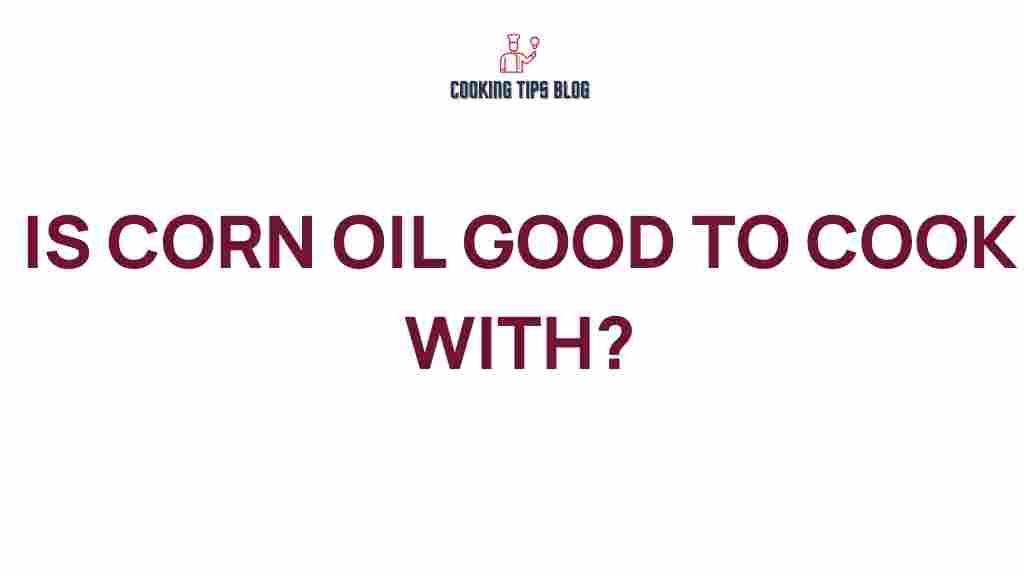Is Corn Oil the Unsung Hero of Your Kitchen?
When it comes to cooking oils, many people gravitate towards olive oil or coconut oil, but have you ever considered corn oil? This often-overlooked kitchen staple is packed with benefits and versatility that can elevate your culinary adventures. In this article, we will explore what corn oil is, its uses, health benefits, and why it deserves a prominent place in your kitchen pantry.
What is Corn Oil?
Corn oil is a type of vegetable oil extracted from the germ of corn kernels. It is commonly used for frying, baking, and salad dressings due to its high smoke point and neutral flavor. This oil is not only versatile in the kitchen but also contains essential nutrients that can contribute to a balanced diet.
Why Choose Corn Oil?
- High Smoke Point: Corn oil has a smoke point of around 450°F (232°C), making it ideal for frying and high-heat cooking.
- Neutral Flavor: The mild flavor of corn oil allows it to blend seamlessly into a variety of dishes.
- Rich in Nutrients: Corn oil contains vitamin E and essential fatty acids, which are beneficial for overall health.
- Cost-Effective: It is often less expensive than other cooking oils, making it a budget-friendly choice for families.
Health Benefits of Corn Oil
Including corn oil in your diet can offer several health benefits:
- Heart Health: Corn oil is low in saturated fats and contains polyunsaturated fats that can help lower bad cholesterol levels.
- Rich in Antioxidants: The vitamin E in corn oil acts as an antioxidant, helping to combat oxidative stress in the body.
- Supports Brain Function: The essential fatty acids found in corn oil play a critical role in brain health and function.
- Improves Skin Health: The moisturizing properties of corn oil can be beneficial for skin health when used in topical applications.
How to Use Corn Oil in Your Cooking
Here’s a step-by-step guide on how to incorporate corn oil into your cooking routine:
1. Frying
Corn oil is excellent for frying due to its high smoke point. Here’s how to get started:
- Choose your protein or vegetable.
- Heat corn oil in a deep pan or fryer until it reaches the desired temperature (about 350°F or 175°C).
- Add your food carefully to avoid splattering.
- Fry until golden brown and cooked through, then remove and drain on paper towels.
2. Baking
Using corn oil in baking can yield moist and flavorful results. Consider the following:
- Substitute corn oil for butter or other oils in your favorite cake or muffin recipe.
- Use it in quick breads for a lighter texture.
3. Salad Dressings
Make your own salad dressing using corn oil:
- Mix equal parts of corn oil and vinegar or lemon juice.
- Add herbs, salt, and pepper to taste.
- Shake well and drizzle over your favorite salad.
Troubleshooting Common Issues with Corn Oil
While corn oil is generally easy to work with, here are some tips for troubleshooting common cooking challenges:
Issue: Oil Smokes Too Quickly
If you find that corn oil is smoking too fast, it could be due to:
- Using old or degraded oil. Always check the expiration date and store it in a cool, dark place.
- Poor temperature management. Use a thermometer to ensure the oil is heated appropriately.
Issue: Food Sticks to the Pan
To prevent sticking, consider the following:
- Ensure the pan is adequately preheated before adding oil.
- Use enough corn oil to coat the bottom of the pan.
Pairing Corn Oil with Other Ingredients
For optimal flavor, consider pairing corn oil with the following ingredients:
- Herbs: Basil, cilantro, and parsley enhance the taste of dishes made with corn oil.
- Spices: Cumin, paprika, and garlic powder can be used to create flavorful marinades and dressings.
- Acid: Lemon juice or vinegar balances the richness of corn oil in salads and marinades.
Storing Corn Oil
To ensure the longevity of corn oil, follow these storage tips:
- Keep it in a cool, dark place away from direct sunlight.
- Seal the bottle tightly to prevent oxidation.
- Check for off-smells or cloudiness before use, which may indicate spoilage.
Conclusion
In summary, corn oil is indeed the unsung hero of your kitchen. Its versatility, health benefits, and cost-effectiveness make it an essential ingredient for various cooking techniques. From frying and baking to salad dressings, corn oil can enhance your meals while contributing to a balanced diet. Next time you’re in the kitchen, don’t overlook this incredible oil; give it a chance to shine! For more information on healthy oils, check out this resource.
Ready to try corn oil in your cooking? Visit your local grocery store or shop online to add this fantastic oil to your kitchen arsenal!
This article is in the category Healthy and created by Cookingtipsblog Team
